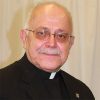Sometime in December 2019 a customer at the Huanan Seafood Market in Wuhan, China, sneezed while buying fish. Sixteen months later, 117 million people had contracted COVID-19 worldwide, of which 2.6 million died, a half million of these in the United States alone. This dramatic manifestation of our global interconnectedness, which continues to impact our lives, is a modern application of John Donne’s classic 1624 meditation, “No Man Is an Island.”
“No one is an island entire of itself, everyone is a piece of the continent, a part of the main; if a clod be washed away by the sea, Europe is the less, as well as if a promontory were, as well as any manner of thy friends or of thine own were; any one’s death diminishes me, because I am involved in humankind. And, therefore, never send to know for whom the bell tolls; it tolls for thee.”
It should come as no surprise to learn Donne was a cleric in the Church of England, for his spirituality clearly mirrors that of St. Paul, who articulated his analogy of the body in 1 Corinthians 12:12. “For even as the body is one and yet has many members, and all the members of the body, though they are many, are one body, so also is Christ.” This keen insight resulted from Paul’s conversion experience on the road to Damascus, while hunting down Christians to arrest them. Suddenly he heard a voice that asked, “Why are you persecuting me?” Paul asked the speaker’s identity and heard: “I am Jesus whom you are persecuting.” This was years after Jesus died, rose and ascended. What Christ revealed is whatever we do to one another, we do to him.
Paul further expanded this collective identity of believers in his epistles, uniting Jews with Gentiles, men with women, free people and slaves. St. Matthew would take up this theme in his account of the Last Judgment, “Whatever you did to one of these least of my brothers and sisters, you did to me” (Matthew 25:40).
We in the English-speaking, Christian West have thus had this understanding of our oneness in Christ ingrained into our culture and philosophy for thousands of years.
St. Francis of Assisi met with Sultan al-Kamil and, after dialogue, each recognized the other as a brother in faith, children of the same God. Surely this prefigured the historic meeting of the saint’s namesake, Pope Francis, with the Grand Ayatollah Sistani in Iraq last March.
Despite heroic acts of unity between peoples of different nationalities, races and religions in recent years, violent resistance to such solidarity, especially by people who identify as Christian, is shocking and alarming. Even though China struggled to contain the COVID-19 virus, many supposedly Christian Americans responded with acts of anti-Asian aggression. Strident opposition to wearing masks, social distancing and lockdowns put the most vulnerable in our society at risk and violated the most basic tenets of our faith: we are, in faith and in fact, our brothers’ and sisters’ keepers.
In his third encyclical, Fratelli Tutti (All Brothers), Pope Francis blames such deplorable responses to the COVID-19 pandemic on a failure in global cooperation due to the breakdown or absence of human fraternity and solidarity: “If only we might rediscover once for all that we need one another, and that in this way our human family can experience a rebirth, with all its faces, all its hands and all its voices, beyond the walls that we have erected.”
COVID-19 exposed a sad truth: Far too many people died from soul-draining isolation as well as from the disease. But it also revealed the nobler side of humanity: people risking their lives for others. A random incident half a world away can impact us all, but so too can acts of charity and sacrifice. As Christians, we cannot exist in a vacuum, separated physically, emotionally and spiritually from others, but must search out new, creative ways to express our connection to one another. We are the Body of Christ here and now.
Featured image: Dr. Anne Berry, who served as a Maryknoll lay missioner in East Africa, talks with a woman in the maternity ward at Bukumbi Hospital in Tanzania. (Jerry Fleury/Tanzania)

